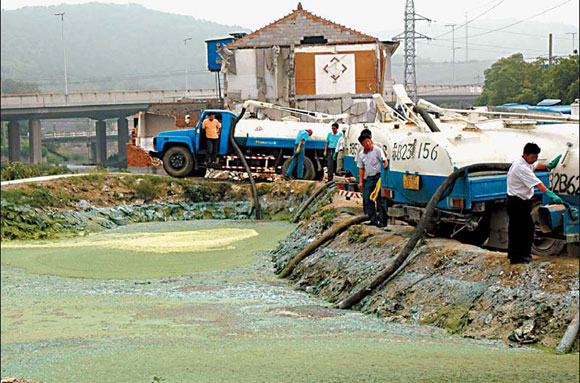Despite repeated reassurances from the government that the algae problem has been brought under control, the people of Wuxi fear for Taihu Lake, and for themselves.

Workers pump blue-green algae out of Taihu Lake on Tuesday.
Memories of last year's blue-green algae outbreak, which polluted drinking water and fouled the air, remain vivid.
"It's not that we don't believe the city government," 33-year-old resident You Jingji, said.
"We just want to be on the safe side."
She said her family stopped using tap water for drinking and cooking last month, after she heard the algae had reemerged in large quantities.
Last year's water crisis was simply too horrible. I'd rather be more careful and take precautions now," You said.
Her precautions include hoarding bottles of distilled water in her small apartment.
Du Yi, who lives in Wuxi's downtown area, shares You's concerns.
She recently spent 2,000 yuan ($290) on a filter to purify her tap water, and said many of her friends have done the same.
Earlier this month, the State Council approved a plan to clean the water in Taihu Lake, while the National Development and Reform Commission said on May 14 that its goal was to prevent any large-scale algae outbreaks this summer.
In a bid to allay residents' fears, the Taihu Valley administration, under the Ministry of Water Resources, said recently that the lake's chlorophyll content - a major indicator of the presence of algae - was being closely monitored but there was no evidence of an algae bloom in near future.
However, Wu Jun, deputy director of the Environmental Protection Science and Technology R&D Center in Yixing, a county-level city within Wuxi, said problems do exist.
"While the volume of industrial waste being discharged into the lake has been reduced significantly since last year's algae bloom, the high levels of ammonia and nitrogen remain a problem," he said, adding that agricultural waste, such as chemical fertilizers, was mostly to blame.
Qin Boqiang, a researcher at the Nanjing Institute of Geography and Limnology, under the Chinese Academy of Sciences, said: "It is not surprising to see algae blooms at this time of the year, as temperatures rise and the water is calm.
"But precautions must be taken to ensure the safety of the water supply."
Last year, the municipal environmental protection bureau shut down more than 770 chemical firms around the lake in a bid to curb the pollution.
However, stronger government action is needed to crack down on polluting companies, and stricter environmental standards should be implemented, Qin said.
(China Daily May 30, 2008)